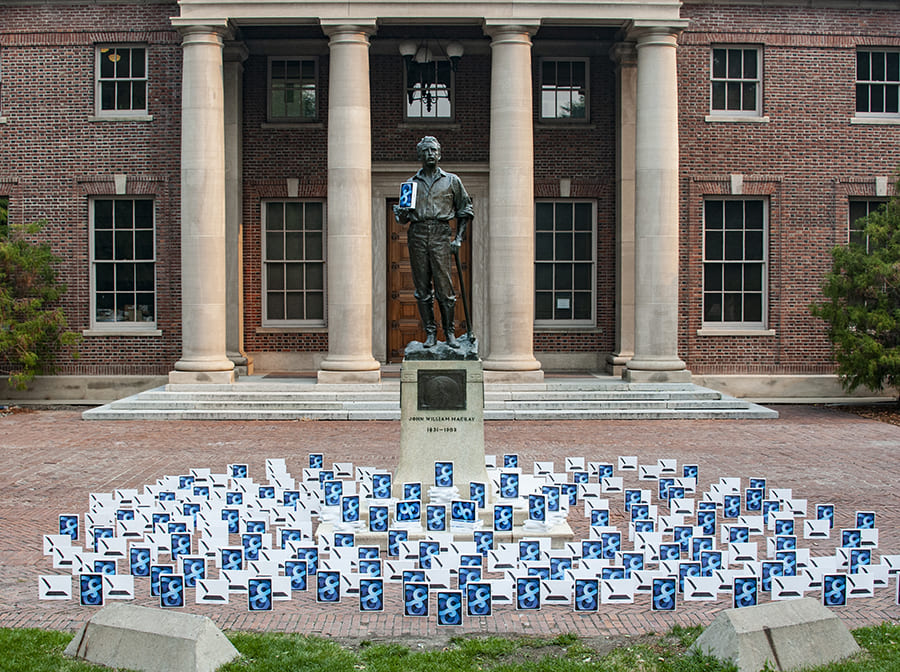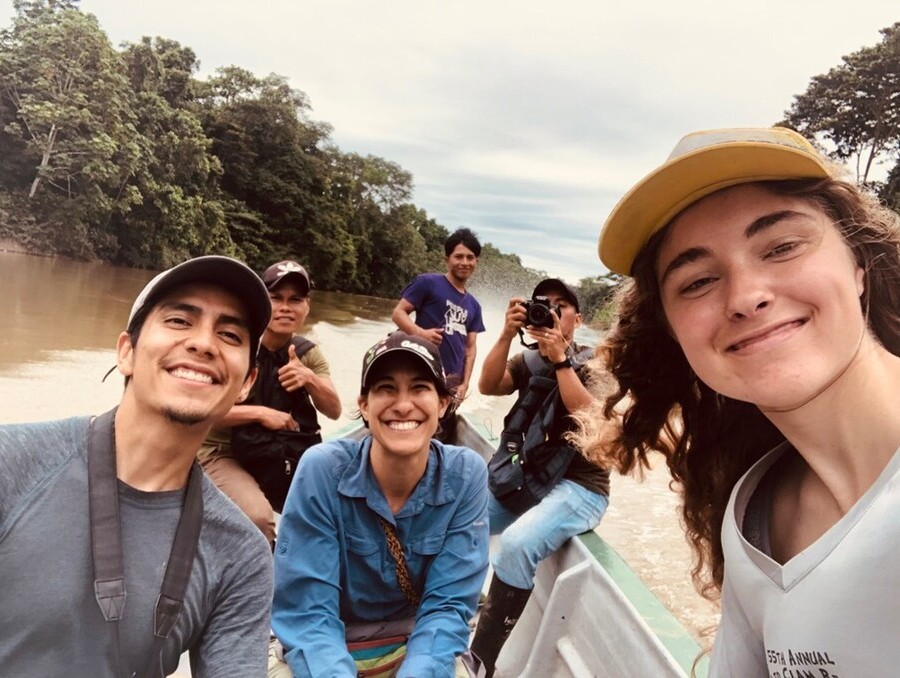The Digital Wolf Pack Initiative is looking ahead to its second year following a wonderful first year of the program with Apple that brought iPad Air, Apple Pencil and Smart Keyboard Folio to more than 3,200 incoming University of Nevada, Reno freshmen and more than 150 University faculty in the Fall of 2021.
"After a successful first year, we are thrilled to be able to expand this initiative to include more students and faculty. We have seen first-hand the impact these devices have had on student success, and the creative ways professors have implemented the iPads in the classroom." Marianne Barrea, acting project manager for this initiative, said. " Faculty and students, across all academic areas, saw the benefits of incorporating the technology into their classrooms and coursework and we intend to increase access."
Initially offered to incoming freshmen, the Digital Wolf Pack Initiative will also now include incoming transfer students. All full-time, newly admitted freshmen received an iPad Air, Smart Keyboard Folio, Apple Pencil and support applications this year and that continues for the 2022-2023 academic year. The University is now offering courses teaching app development using the programming language Swift.
"Our ultimate goal is to have this technology in the hands of every student and instructor," Jeff Thompson, University executive vice-president and provost, said. "We want to provide access, as well as create a pathway to success for all students. The Digital Wolf Pack Initiative equips students with the necessary tools and skills for their future."
Using Apple technology, the University created the Digital Wolf Pack Initiative, a program that provides a common learning platform and equal access to technology and digital tools for faculty and new students. Currently, the devices are purchased through Apple Inc. using an allocation from the University’s investment income. Devices are free to students.
The program is designed to augment digital literacy and increase student success by providing enhanced curriculum and experiences that expand digital skillsets and provide a platform to personalize the learning experience. In a survey, 98% of students who received the iPad devices said they view them as a valuable tool for their education and 93% said they will use them to complete assignments while others said they will use them for notetaking and connecting with faculty and classmates.
“I use my iPad often in all my classes," a student who was part of the first year of the program said. "I think the Digital Wolf Pack Initiative is awesome and has definitely helped me become a better and more organized student. I also feel more engaged when taking notes on the iPad.”
Students from art to engineering, math, science, English, theater, dance and music have seen the benefits.
“I take note-heavy classes like MATH 182 and 183," another student said. "I recently set up my own server so I could code on it too. This program (Digital Wolf Pack Initiative) is absolutely worth it. I don't know what I would do without my iPad for notes.”
Said another student, “I use my iPad in some way for all of my classes. If there are more notes required for a class, then I use it more often for that class. I use my iPad for school more than my laptop due to its versatility, note taking capabilities and portability. I think that this program has really done well for students."
The University learned a great deal about teaching, testing and assessment, and student support as the campus navigated the challenges of the pandemic. One of the major lessons has been that digital literacy and digital accessibility are at the forefront of future student success – not only on their path to graduation, but in becoming leaders in a highly competitive and ever-evolving careers marketplace.
"Through the Digital Wolf Pack Initiative, we provide our students with the best available technology to increase their digital literacy and enhance their success in the classroom, so they are prepared for the new economy," Brian Sandoval, president of the University of Nevada, Reno, said. "Our hope is that the Digital Wolf Pack Initiative will open the door for students to gain the necessary skills to create the future of their making."
Bridging digital divide
"The Digital Wolf Pack Initiative provides an excellent step forward in bridging the digital divide facing many of our students, while also providing us an opportunity to amplify existing digital learning resources to our student body," Barrea said. "We have begun targeting departments on campus that work extensively with our core curriculum, such as math and core writing. Every faculty member who teaches core curriculum in these departments are being offered a device and the chance to work together to enhance their curriculum with the aid of these devices."
This year as many as 150 professors received and integrated the iPad Air devices into their classrooms with the help of the Office of Digital Learning in the Office of Information Technology.
"In support of faculty using the iPads, we developed both student and faculty resource courses in WebCampus that contain tutorials on some of the most common iPad tasks," Ed Huffman, executive director of the Office of Digital Learning, said. "Faculty were enrolled in both so they could familiarize themselves with what resources were available to students and potentially direct students to them as needed."
The Office of Digital Learning and Apple Professional Learning Specialists have provided faculty with training opportunities related to use of the device, using the device in university classrooms, using the device with Zoom and various other topics.
In order to support the growing community of faculty iPad users, a bi-monthly ongoing series was developed that fosters discussion and learning opportunities related to teaching with the iPads. These events are Thursday afternoons throughout the spring and fall terms.
"Over the fall and winter breaks we held an intensive training with faculty who received devices to help create a community of users and foster conversations about effective use in teaching and incorporation into their courses," Huffman said.
And comments from professors who used the iPads in their classrooms were enthusiastic.
“I see students using their iPad much like they would a traditional notebook: to take notes, design projects, sketch," one art instructor said. "The iPad allows them to research their projects from their classroom seat and even create content for their books which can be printable and replicable (essential for the work we do in our classes)."
Another art professor said, "Even in a short amount of time, we have witnessed our students take this technology and run with it. They have integrated the use of the iPad in innovated and unexpected ways, and it seems as though the sky’s the limit."
English professors noted that “iPad works great for creating multimodal projects and to help students learn to annotate on digital documents;” and “Students now have greater access for online research, readings, note taking and online class work - in and outside of class.”
“iPad has become a fixture in the world of music," a music professor said. "Some tools include: sheet music, metronome, tuning device, recording audio and video, ear-training, music notation, composition, charts for improvisation, audio and video editing." And in theater and dance, “The iPad will be very useful to the students in the design areas for rendering, drafting and presenting research as visual ideas in design classes and meetings.”
Digital Wolf Pack Initiative programs
Whether students are freshmen or already advancing through their academic careers at the University, there are resources, tools and instruction available on our campus to help. The University offers a range of programs to help students gain digital skills and strengthen their ability to work with technology.
“We offer regular trainings for both students and faculty and provide one-on-one session for all those who request it,” Barrea said. "It is incredibly important to us that we can not only provide the devices, but also support them and their users to truly maximize all that these devices have to offer."
From basic actions to more complex operations, students can visit Canvas to view the Digital Wolf Pack Student Toolkit and access a collection of resources. To provide live support to students, weekly workshops are offered covering topics like note-taking, presenting, organization, design and more. The University has also developed courses, named App Development With the Wolf Pack, that allow students from any discipline to create their own app using Swift, an Apple app developer software compatible with the iPad Air.
The app development courses, designed and directed by an Apple Professional Learning Specialist who works on campus, are open to all students and faculty across the University, not just those who have received the iPad Air through the digital initiative.
"We recognized the great value the students in the program are receiving with the coding courses and expanding their capabilities with the iPads, so we are promoting the courses for all students and encouraging them to use the resource," David Shintani, vice-provost for undergraduate education, said.
The digital initiative was designed to provide a common platform for all University of Nevada, Reno students, equipping them with tools to help them to succeed. The digital literacy curriculum, including this interdisciplinary app development curriculum, also provides students with skills for their future careers.
"The University has always worked to provide student and faculty access to the most current technology," Provost Thompson said. "The Digital Wolf Pack Initiative is a significant leap forward in providing greater access to digital tools that will help our students throughout their time as scholars on our campus. Additionally, it will assist students as they transition to professionals in the marketplace, while strengthening our academic curriculum in its scope and impact."
















